 | |
Argentina | Japan |
|---|---|
Diplomatic relations were established in the late 19th century, between Argentina and Japan.
Contents


 | |
Argentina | Japan |
|---|---|
Diplomatic relations were established in the late 19th century, between Argentina and Japan.


According to a file of the Royal Court of Córdoba, Argentina, there was a Japanese young man baptized as Francisco Xapon, which indicated his arrival in the country. He was sold as a slave in 1596 by the slave merchant Diego López de Lisboa, to the priest Miguel Jerónimo de Porras. In 1598, Xapón won liberty at a trial, and was released. [1] [2] The history of Japanese-Argentine relations was influenced to a large extent by Argentina being a country of immigration. The first known Japanese to immigrate to Argentina arrived by boat in 1886. Among the Japanese to immigrate to Argentina was Professor Seizo Itoh, expert on agriculture, who came to Argentina in 1910 and worked to improve the level of agriculture in his new country.[ citation needed ]
The Empire of Japan and Argentine Republic established formal diplomatic relations at a Legation level with a Treaty of Amity, Commerce and Navigation on February 3, 1898. Following the conclusion of the agreement, regular trade relations by sea began in 1899.[ citation needed ]
Argentina assisted Japan in the Russo-Japanese War by agreeing to sell Japan the cruiser Nisshin, which had originally been purchased for the Argentine Navy. However, prior to 1941, the main aspect of relations between Argentina and Japan was immigration, mostly of agricultural laborers. There are currently an estimated 10,000 people of Japanese descent living in Argentina. [3]
Diplomatic relations between Japan and Argentina were raised to Embassy level in 1940, and the following year Rodolfo Morena was appointed the first Argentine Ambassador to Japan, while Akira Tomii became the first Japanese Ambassador to Argentina. Relations were severed in 1944, and on March 27, 1945, the Argentine government entered World War II on the Allied side and declared war on the Japanese Empire.[ citation needed ]

Diplomatic relations were restored by the signing of the San Francisco Peace Treaty in 1952. [4] Argentine president Arturo Frondizi visited Japan in 1960, and subsequently bilateral trade and Japanese investment into Argentina have increased in importance. Japanese imports were primarily foodstuffs and raw materials, while exports were mostly machinery and finished products. In addition, agreements on cooperation in various aspects were concluded. In 1963, the two governments concluded agreement on immigration, in 1967 a treaty of amity, commerce and navigation and in 1981 agreements on technical cooperation and cultural exchange.
Argentina maintains an embassy in Tokyo and Japan maintains an embassy in Buenos Aires.
Members of the Imperial Family of Japan have visited Argentina on a number of occasions, including Prince and Princess Takamado in 1991, Emperor and Empress Akihito in 1997 and Prince and Princess Akishino in 1998. Argentine President Raúl Alfonsín visit Japan in 1986, as did President Carlos Menem in 1990, 1993 and 1998.

Foreign relations between Argentina and Greece have existed for about half a century. Both countries are represented by an embassy in the other one's capital. According to the Greek foreign ministry, at least 50,000 persons of Greek descent live in Argentina with about 5,000 with Greek passports. The majority of Greeks live in Buenos Aires.
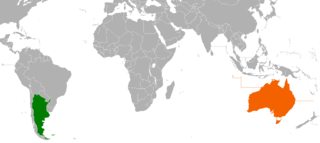
Bilateral relations between Argentina and Australia have existed for years. Both nations are members of the Cairns Group, Forum of East Asia–Latin America Cooperation, G20 and World Trade Organization.

The current and historical relations between the Argentine Republic and the Republic of South Africa, for over a century. Both nations are members of the Cairns Group, G20, Group of 77 and the United Nations.

Diplomatic relations between the Argentine Republic and Ukraine, have existed for decades. The importance of relations centers on the history of Ukrainian migration to Argentina. Ukrainians in Argentina form the second largest Ukrainian community in Latin America numbering approximately 250,000 Ukrainians and their descendants. Both nations are members of the World Trade Organization.
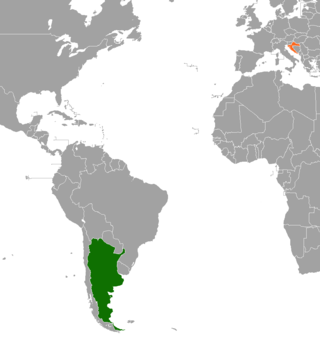
Argentina and Croatia both enjoy friendly relations, the importance of which centers on the history of Croatian migration to Argentina. There is approximately a community of 250,000 Argentines of Croatian descent. Both nations are members of the United Nations.
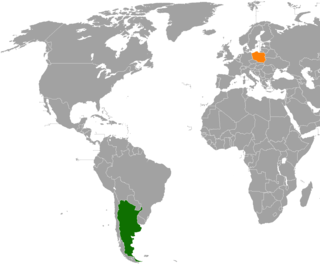
Diplomatic relations between Argentina and Poland, have existed for over a century. Over 500,000 Argentines are of Polish descent making Argentina the second Latin-American country with the largest Polish community abroad.

Current and historical relations between the Argentine Republic and the Russian Federation have existed for decades. Both nations are members of the G20, United Nations and the country is a potential new member of the BRICS grouping which includes Brazil, Russia, India, China and South Africa

Diplomatic relations have existed between the Argentina and the Austria for decades. Both nations are members of the United Nations.

Diplomatic relations between the Argentine Republic and Hungary have existed for decades. Argentina is host to one of the largest Hungarian communities outside of Hungary. There are approximately 30,000 to 40,000 Argentines of Hungarian descent. Both nations are members of the United Nations.
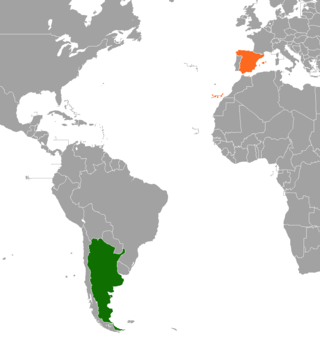
Argentina–Spain relations are the bilateral relationship between the Argentine Republic and the Kingdom of Spain. Since a great portion of the immigrants to Argentina before the mid-19th century were of Spanish descent, and a significant part of the late-19th century/early-20th century immigrants to Argentina were Spaniards, the large majority of Argentines are at least partly of Spanish ancestry. Both nations are members of the Organization of Ibero-American States and the United Nations.

The current and historical relations between the Argentine Republic and the Portuguese Republic, have existed for over a century. Both nations are members of the Organization of Ibero-American States and the United Nations.

Spain–Uruguay refers to the current and historical relations between Spain and Uruguay. There is community of 67,000 Spanish nationals residing in Uruguay and 33,000 Uruguayan nationals residing in Spain. Both nations are members of the Association of Spanish Language Academies, Organization of Ibero-American States and the United Nations.

Paraguay–Spain refers to the current and historical relations between Paraguay and Spain. Both nations are members of the Association of Spanish Language Academies and the Organization of Ibero-American States.
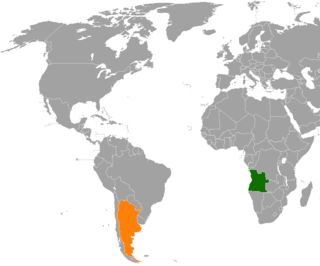
The Republic of Angola and the Argentine Republic are members of the Group of 77 and the United Nations.

Poland–Uruguay relations are foreign relations between Poland and Uruguay. Neither country has a resident ambassador. Both nations are members of the United Nations.

Diplomatic relations between the Argentine Republic and the Republic of the Philippines, have existed for decades. Both nations are members of the Association of Academies of the Spanish Language, Group of 77, the G20 developing nations, and Forum of East Asia-Latin America Cooperation and the United Nations.
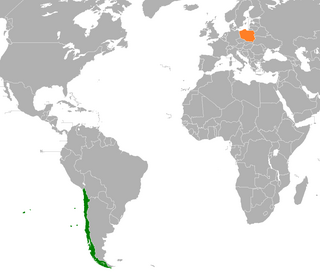
Chile and Poland maintain diplomatic relations. Both nations are members of the OECD.

Ecuador–Japan relations are the diplomatic relations between Ecuador and Japan. Both nations are members of the Forum of East Asia–Latin America Cooperation.
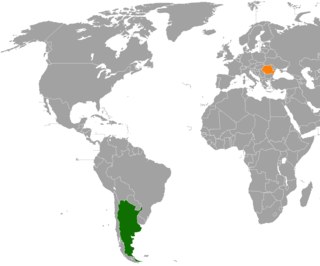
Diplomatic relations between the Argentine Republic and Romania, have existed for over a century. Both nations are members of the United Nations.

Chile–Portugal relations refers to the diplomatic relations between the Republic of Chile and the Portuguese Republic. Both nations are members of the OECD, Organization of Ibero-American States and the United Nations.